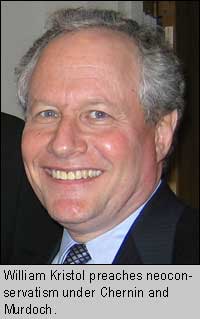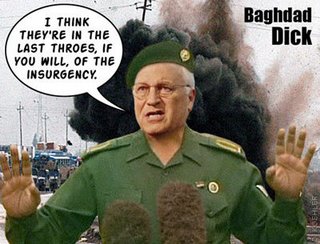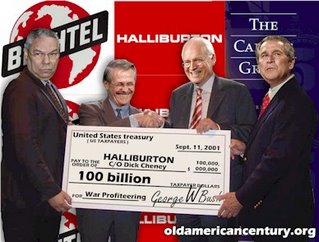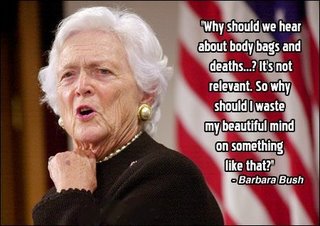Those Who Would Rule Us
 On the January 29 edition of Fox Broadcasting Co.'s Fox
On the January 29 edition of Fox Broadcasting Co.'s FoxNews Sunday, Weekly Standard editor William Kristol distorted Democratic National Committee chairman Howard Dean's criticism of the Bush administration's warrantless domestic surveillance program. Kristol claimed that Dean, during an interview on the program, had asserted that the controversial program was "probably some kind of domestic spying on political enemies." But Dean made no such allegation. Rather, he expressed concern that the National Security Agency (NSA) -- having been authorized by President Bush to intercept the international communications of U.S. residents without a warrant -- was eavesdropping on innocent Americans. He further criticized the program's lack of legal oversight as infringing on "the rights of ordinary Americans not to be intruded on by their government."
http://mediamatters.org/items/200601300002
...
the vice-president, defense secretary, and deputy defense secretary were all associates of the Project for the New American Century, while Secretary of State Powell and his top appointee, Deputy Secretary of State Richard Armitage—also a PNAC associate—represented a realist unipolarism that accented diplomatic cooperation.
From there the unipolarist appointments went all the way down. Of the eighteen figures who signed the PNAC’s 1998 letter to Clinton calling for regime change in Iraq, eleven took positions in the Bush administration. In addition to Armitage, Rumsfeld and Wolfowitz, they were Elliot Abrahms (senior director for near east, southwest Asian and North African affairs on the National Security Council); John Bolton (undersecretary, Arms Control and International Security); Paula Dobriansky (undersecretary of state for global affairs); Zalmay Khalilzad (president’s special envoy to Afghanistan and ambassador-at-large for Free Iraqis); Richard Perle (chair of the Pentagon’s semi-autonomous Defense Policy Board); Peter W. Rodman (assistant secretary of defense for international security affairs); William Schneider, Jr. (chair of the Pentagon’s Defense Science Board); and Robert B. Zoellick (U.S. trade representative). Other PNAC associates and/or prominent unipolarists who landed high-ranking positions included Stephen Cambone (director of the Pentagon Office of Program, Analysis and Evaluation); Eliot Cohen (Defense Policy Board); Devon Gaffney Cross (Defense Policy Board); I. Lewis Libby (Vice President Cheney’s chief of staff), William Luti and Abram Shulsky (eventually, directors of the Pentagon’s Office of Special Plans), James Woolsey (Defense Policy Board), and David Wurmser (special assistant to the undersecretary of state for arms control). Libby served as assistant to the president and national security adviser to the vice-president in addition to being Cheney’s chief of staff, an unprecedented trifecta of positions that amplified Cheney’s influence.

Kristol and Kagan warned that if the U.S. made Phase One deals with Hezbollah and the Iranian government it would never get to the Phase Two work of destroying them. A month after 9/11, the Weekly Standard featured a cover article by Max Boot titled “The Case for American Empire.” Boot argued that imperialist realism was America’s most realistic option; 9/11 was a wake-up call for the United States to unambiguously embrace its imperial responsibilities. America felt conflicted in its imperial role, he explained, which emboldened its enemies. Now America had to deflate its enemies by aggressively using its overwhelming power.
Neo-cons Krauthammer, Angelo Codevilla, David Frum, Frank Gaffney, Michael Ledeen, Laurent Murawiec, Richard Perle, Norman Podhoretz, and others called for offensive wars of destruction against several regimes. Iraq, Syria, North Korea and the Palestinian Authority were named most often, in addition to Hezbollah; some lists included Cuba, Egypt, Lebanon, Libya, Saudi Arabia, Somalia, and Sudan. Kristol and Kagan emphasized Iraq, Iran, and Hezbollah. “This war will not end in Afghanistan,” they vowed in October 2001. “It could well require the use of American military power in multiple places simultaneously. It is going to resemble the clash of civilizations that everyone has hoped to avoid. And it is going to put enormous and perhaps unbearable strain on parts of an international coalition that today basks in contented consensus.”
In January 2002, while American forces mopped up in Afghanistan, Kristol and Kagan urged Bush to get on with the real business. It was true that the U.S. needed to , build a functional government in Afghanistan, capture bin Laden, destroy al Qaeda.
... but overthrowing Iraq was more important and urgent. The Iraqi threat got bigger every day “and it can’t wait until we finish tying up all the ‘loose ends.’ ” Iraq was the supreme test of America’s global hegemony. “Whether or not we remove Saddam Hussein from power will shape the contours of the emerging world order, perhaps for decades to come,” they explained. To merely contain Saddam Hussein would ensure that thugs of his kind would be tolerated. Thus the question of Iraq was “the supreme test of whether we as a nation have learned the lesson of September 11.”
 They brushed aside objections that invading Iraq would divert attention from destroying al Qaeda, or that the cure of war and occupation would be worse than the disease. A civil war would be unfortunate, but not as bad as “the disease of Saddam with weapons of mass destruction.” And the diversion argument was a red herring. America fought Japan and Germany at the same time, and it was far more powerful in 2002. As for unilateralism versus multilateralism, they hoped that other nations would support the U.S. and share its burdens, but that was up to them. There was too much at stake to be slowed or deterred by anybody’s objections
They brushed aside objections that invading Iraq would divert attention from destroying al Qaeda, or that the cure of war and occupation would be worse than the disease. A civil war would be unfortunate, but not as bad as “the disease of Saddam with weapons of mass destruction.” And the diversion argument was a red herring. America fought Japan and Germany at the same time, and it was far more powerful in 2002. As for unilateralism versus multilateralism, they hoped that other nations would support the U.S. and share its burdens, but that was up to them. There was too much at stake to be slowed or deterred by anybody’s objections...

By January 2003, the Bush administration spoke with one voice on Iraq, and the following month, Powell made its showcase brief for war at the United Nations. Kristol’s pro-war primer, however, The War Over Iraq, co-authored with New Republic Senior Editor Lawrence F. Kaplan, contained some anti-Powell holdovers. For the entire second half of 2002, Powell had cautioned that a U.S. invasion of Iraq might provoke its Sunni establishment to plunge the country into chaos. Kristol and Kaplan countered that Powell had made the same warning about Afghanistan, where the ethnic Pashtuns played the Iraqi Sunni role. They assured that Iraq’s Sunni, Shi’ite, and Kurdish populations all wanted a unified nation and that the best way to do it was to build a federated system consisting of a central government in Baghdad and limited powers of self-government for each ethnic community.
 ...
...Just after American forces marched into Baghdad, Kristol announced that Iran had to be next, along with North Korea. The battle for Iraq was “the end of the beginning” of a larger war for the world, he explained, and the “next great battle” was for Iran: “We are already in a death struggle with Iran over the future of Iraq. The theocrats ruling Iran understand that the stakes are now double or nothing.”
Kristol took pride that his ideas about global supremacy, regime change, preemptive war, democratic globalism, and weapons of mass destruction became the causes of a popular Republican administration. “We at the Weekly Standard and the Project for the New American Century—and many other people, Wolfowitz way back in 1992—had articulated chunks and parts of what later became the Bush Doctrine,” he observed. “Certainly there was a lot out there that could be stitched together into the Bush Doctrine. But certainly, even people like me were kind of amazed by the speed and decisiveness with which the Bush administration, post-9/11, moved to pull these different arguments together.”
http://www.logosjournal.com/issue_3.2/dorrien.htm
Gary Dorrien is the Parfet Distinguished Professor at Kalamazoo College. His eleven books include Imperial Designs: Neo-conservatism and the New Pax Americana, forthcoming from Routledge, from which this article is adapted.


1 Comments:
[b][url=http://cheap-car-insurance.quickfreehost.com] diamond car insurance [/url][/b]
[b][url=http://seoguide.ws] general car insurance [/url][/b]
[b][url=http://nutritionguide.ws] car insurance san diego [/url][/b]
[b][url=http://affiliaterevenueguide.ws] car insurance canada [/url][/b]
[b][url=http://careeremploymentguide.com] geico car insurance quote [/url][/b]
[b][url=http://fitnessequipmentguide.net] compare car insurance rate [/url][/b]
[b][url=http://inetmarketingguide.ws] geico car insurance [/url][/b]
[b][url=http://interiordecorguide.ws] infinity car insurance [/url][/b]
[b][url=http://landscapingguide.ws] car insurance group [/url][/b]
[b][url=http://mortgageguide.ws] car
insurance philadelphia [/url][/b]
[b][url=http://personalfinanceguide.ws] car insurance cost [/url][/b]
[b][url=http://trafficbuildingguide.net] car insurance for mexico [/url][/b]
[b][url=http://vacationrentalsguide.ws] cheap car insurance quote uk [/url][/b]
[b][url=http://wealthbuildingguide.net] low cost car insurance online [/url][/b]
[b][url=http://progressive-car-insurance.wealthbuildingguide.net] mercury car insurance [/url][/b]
[b][url=http://compare-car-insurance.vacationrentalsguide.ws] car insurance los angeles [/url][/b]
[b][url=http://cheapest-car-insurance.trafficbuildingguide.net] car insurance canada [/url][/b]
[b][url=http://classic-car-insurance.personalfinanceguide.ws] cheap car insurance rate [/url][/b]
[b][url=http://free-car-insurance-quote.mortgageguide.ws] auto insurance quote [/url][/b]
[b][url=http://cheap-car-insurance-quote.landscapingguide.ws] car
insurance philadelphia [/url][/b]
[b][url=http://low-cost-car-insurance.interiordecorguide.ws] car insurance comparison [/url][/b]
[b][url=http://car-insurance-quote.inetmarketingguide.ws] car insurance rats [/url][/b]
[b][url=http://car-insurance-rates.homeimprovementguide.ws] discount car insurance [/url][/b]
[b][url=http://new-york-insurance.fitnessequipmentguide.net] washington car insurance [/url][/b]
[b][url=http://california-car-insurance.estateguide.ws] best car insurance [/url][/b]
[b][url=http://car-insurance-rate.careeremploymentguide.com] new jersey car insurance [/url][/b]
[b][url=http://auto-insurance-company.affiliaterevenueguide.ws] nationwide car insurance [/url][/b]
[b][url=http://online-car-insurance.acneguide.ws] free car insurance quote [/url][/b]
[b][url=http://auto-cheap-insurance.nutritionguide.ws] budget car insurance [/url][/b]
[b][url=http://auto-insurance-quote.seoguide.ws] geico car insurance quote [/url][/b]
http://cheap-car-insurance.quickfreehost.com
Random Keyword: :)
[b]cheap car insurance quote uk[/b]
Post a Comment
<< Home